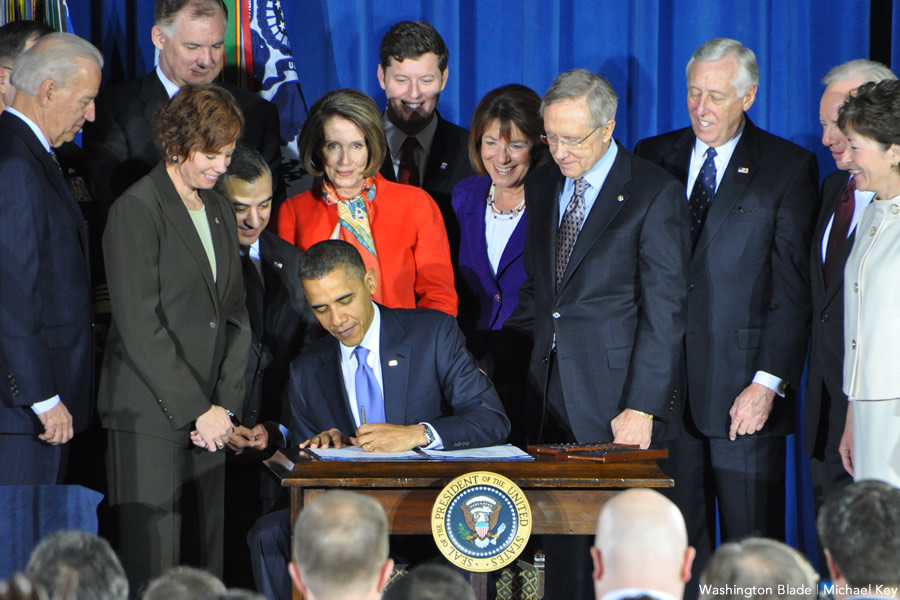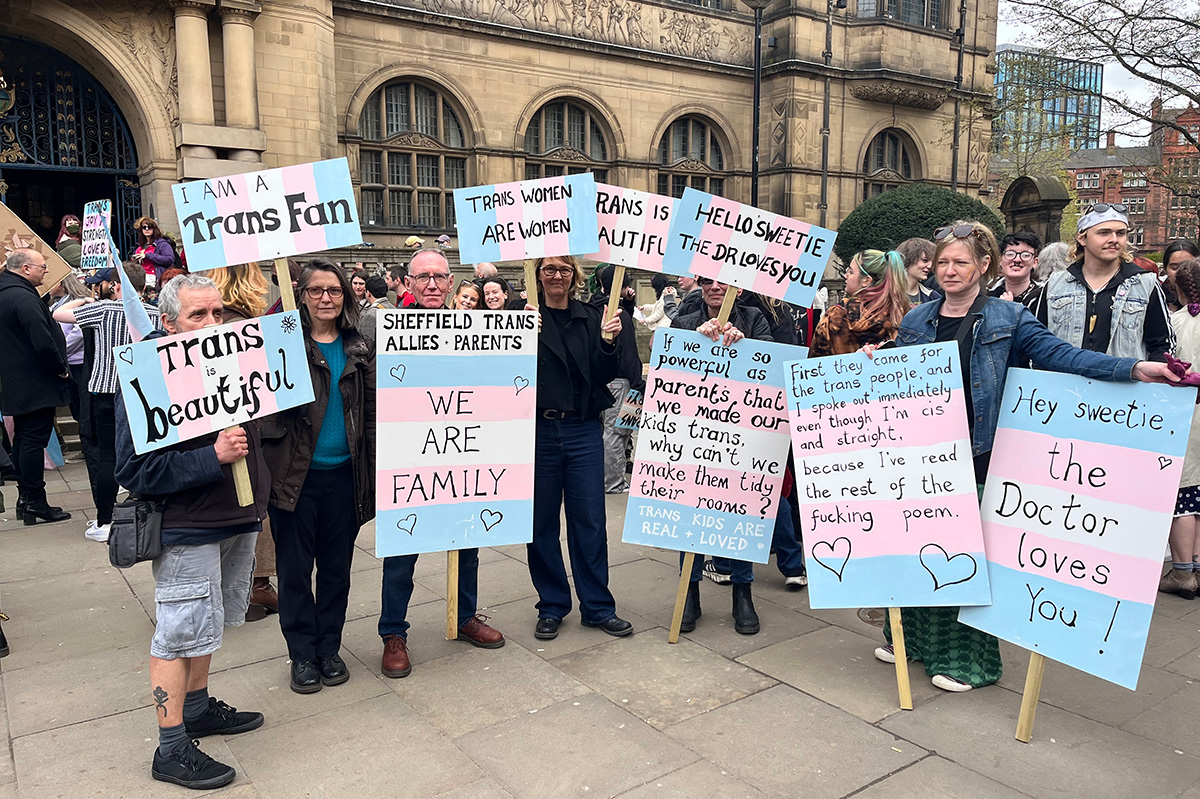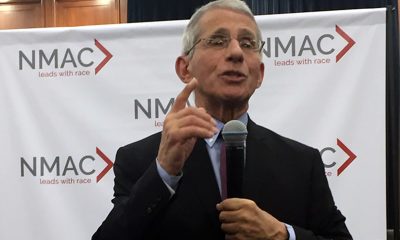Commentary
Recalling the struggle to repeal ‘Don’t Ask, Don’t Tell’
10 years later, gov’t still cleaning up the mess of failed law

Franklin Burch was ecstatic marching down the street waving a small American flag and an “Uncle Sam: I Want You” poster during the March on Washington for Lesbian, Gay, and Bi Equal Rights and Liberation. “Gays and lesbians have a right to serve,” the 70-year old gay vet from Los Angeles told the Washington Post on April 25, 1993. “This is America, and we have these rights.”
An estimated 700,000 LGBTQ and allies agreed, marching past the White House and pouring onto the Mall, many grasping for hope during the horrific Second Wave of AIDS. An idealistic optimism was palpable. Gays had voted en masse to elect Bill Clinton as president of the United States, ejecting the Reagan-Bush administration that ignored the deaths of a generation of gay men. Clinton had promised money for AIDS research and pledged nondiscrimination policies, including lifting the ban on gays and lesbians serving in the military.
ANGLE’s David Mixner, a Clinton friend from the anti-Vietnam War days, strenuously pointed out that the U.S. military was America’s largest employer, enabling gay people stuck in hateful environments to get out, get an education, see the world and serve their country. Not giving gays that opportunity was unfair, and therefore, un-American.
The March on Washington program opened with a stunning Robin Tyler-produced encapsulation of the moment – a sense of pride in our patriotism. To a recording of military theme songs, flag-bearing gays and lesbians who had been drummed out of the military marched onstage, accompanied by some active-duty military coming out publicly based on Clinton’s promise. Navy Officer Keith Meinhold and Army Col. Margarethe “Grethe” Cammermeyer ended the procession, with Cammermeyer calling everyone to attention. The crowd – including me – stood at attention, too, tears streaming down our faces at the courage of our people to serve a country that still treated us as deviants.
Then Dorothy Hajdys took the stage carrying a framed photo of her son, Petty Officer Third Class Allen Schindler, murdered six months earlier in a public toilet in Sasebo, Nagasaki, Japan by two shipmates. The coroner said Schindler’s injuries were worse “than the damage to a person who’d been stomped by a horse.” Schindler could only be identified by the tattoos on his arm. The March on Washington crowd gave Hajdys a 10-minute standing ovation. We knew the cost of freedom.
House Speaker Nancy Pelosi read a letter from Clinton, who didn’t attend or send a video, as expected. “I stand with you in the struggle for equality for all Americans, including gay men and lesbians,” Clinton wrote. “In this great country, founded on the principle that all people are created equal, we must learn to put aside what divides us and focus on what we share.”
Liberal Democratic icon Sen. Edward M. Kennedy spoke via an audio tape, comparing our March to the famous civil rights march of 1963. “We stand again at the crossroads of national conscience,” Kennedy said.
But there were hints of a coming storm. Robin Tyler tore a Clinton telegram of apology on stage as unacceptable. “A Simple Matter of Justice” banner flapped in the background as beloved ally actress Judith Light said: “I am grateful to you, the gay and lesbian community, for the impact you are having on all of society. I am grateful for your teaching Colin Powell about equal opportunity. I am grateful for your teaching Sam Nunn about moving into the 20th century. I am grateful for your teaching George Bush about the consequences of irresponsible neglect and misuse of power. And you are in the process of teaching President Clinton the importance of being a leader and the dangers of compromising with what is right and just.”
But teaching doesn’t equal lessons learned. Clinton betrayed us, agreeing to a Nunn-devised “compromise” on lifting the gay ban called “Don’t Ask, Don’t Tell, Don’t Pursue.” Democratic Sen. Sam Nunn and Republican John Warner evoked horrific “gay sexual predator” images as they went aboard a submarine to ask sailors how they’d feel lying in such proximity to a gay shipmate. The subtext was clearly an invitation to harass those suspected of being gay and lesbian. Witch hunts were sport.
The cruelty of DADT went beyond the physical. If a buddy on the frontlines in Iraq or Afghanistan was killed by an improvised explosive device (IED), the gay service member could not share the fear, the pain, the trauma because letters back home were checked and psychiatrists and chaplains had to report gay-related confessions. The lives of 14,000 gay, lesbian and bisexual service members were ruined by the time DADT officially ended a decade later, on Sept. 20, 2011. Today, marking the 10th anniversary of the official repeal, the Veterans Administration concedes it is still catching up with all the damage governmental politics created. It’s estimated that more than 114,000 LGBTQ service members or those perceived to be LGBTQ were discharged between Franklin Burch’s service in World War II and the repeal of DADT.
“Although VA recognizes that the trauma caused by the military’s decades-long policy of discrimination against LGBTQ+ people cannot be undone in a few short months, the Biden administration and Secretary McDonough are taking the steps necessary to begin addressing the pain that such policies have created. LGBTQ+ Veterans are not any less worthy of the care and services that all Veterans earn through their service, and VA is committed to making sure that they have equal access to those services,” writes Kayla Williams, a bisexual veteran and assistant secretary for public affairs in VA’s Office of Public and Intergovernmental Affairs on the VA blog.
Clinton’s betrayal broke our hearts and ruined lives. But amazingly, it did not stop us — which attorney C. Dixon Osburn, a civilian graduate of Georgetown University Law, recounts in his just released must-read book “Mission Possible: The Story of the Repealing of ‘Don’t Ask, Don’t Tell.’” This is the stunning story of how Osburn and attorney Michelle Benecke, a Harvard Law graduate and former Army captain, founded Servicemembers Legal Defense Network to immediately help desperate service members and work with nonprofit allies and law firms to challenge DADT in the courtroom and in the court of public opinion.
“Mission Possible” completes an important trilogy about LGBTQ people serving in the U.S. military, next to “Coming Out Under Fire,” by Alan Bérubé and Randy Shilts’ “Conduct Unbecoming: Lesbians and Gays in the U.S. Military.” These books are not only LGBTQ history, but about our patriotism and what drives our private lives — and how government has intervened to block us at every step based on bias.
“Mission Possible” is also a book about endurance, ingenuity, and triumph. If a united gay voting bloc and 700,000 people on the Mall and thousands more back home didn’t give Clinton enough clout or backbone to keep his promise to lift the gay military ban – SLDN needed a smart, comprehensive strategy and a willingness and stamina to keep their eyes on the distant prize of repealing DADT. After educating an anti-military community and fighting a “graveyard mentality” that believed that lifting the gay ban was impossible, they had to figure out how to secure bipartisan support.
And there was bipartisan support, privately. “Party sticks with party, unless there’s a breakthrough, Osburn says, noting that GOP Sen. Lisa Murkowski told him: “You have to create the moment so I can be with you.”
With the discharge of the Arab linguists, DADT became less an issue of civil rights and more publicly an obstacle to national security. There are scores of nail-biting behind-the-scenes stories about how SLDN shifted the public and military consciousness from July 1993 to September 20, 2011, “when President Barack Obama, Secretary of Defense Robert Gates, and Admiral Mike Mullen, chairman of the Joint Chiefs of Staff, certified to Congress that implementing repeal of the policy would have no effect on military readiness, military effectiveness, unit cohesion, or recruiting and retention.”
Dec. 18, 2010 – on Osburn’s birthday – the Senate finally voted to deliver more than 60 votes to overcome Republican Sen. John McCain’s repeated and stubborn use of the filibuster to block repeal. There are echoes of political machinations of today.
There are crafty stories, as well, illustrating the absurdity of DADT. For instance, Army Sergeant Darren Manzella, Osburn writes, “was the epitome of the competent, well-regarded openly gay soldier who put a lie to the belief that his mere presence would weaken military readiness. He was out to his Army buddies and had even introduced them to his boyfriend.” In 2006 at Fort Hood, he started getting anonymous emails and “calls warning him that he was being watched and to ‘turn the flame down.’” He sought advice from his commanding officer which triggered an investigation, with which Manzella fully cooperated. The Army concluded he wasn’t gay and told him to go back to work. He was subsequently deployed to Iraq, then Kuwait, unsure whether a new commander would discharge him.
SLDN reached out to Manzella to see if he’d be willing to do a 60 Minutes interview, explaining the pros and cons if he went forward. He said yes, but how to do it knowing the Army wouldn’t grant permission? SLDN communications director Steve Ralls came up with a plan. “Manzella signed up to run in the Army marathon in Kuwait. At a predetermined point, he veered off-course to a waiting car that whisked him to a hotel, where he changed into civilian clothes and met with correspondent Lesley Stahl. After the interview, he changed back into his running clothes, the crew doused him with sweaty water, and the car whisked him back so he could cross the finish line,” Osburn writes. “Once the segment was broadcast, the Army could no longer pretend that Manzella wasn’t gay, or that ‘Don’t Ask, Don’t Tell’ was a law with an on-off switch. He was discharged six months later and became one of the many vocal advocates for repeal.”

On Dec. 22, 2010, President Barack Obama kept the campaign promise he made and signed the repeal of Don’t Ask, Don’t Tell. “For we are not a nation that says, ‘don’t ask, don’t tell.’ We are a nation that says, ‘Out of many, we are one.’ We are a nation that welcomes the service of every patriot. We are a nation that believes that all men and women are created equal. Those are the ideals that generations have fought for. Those are the ideals that we uphold today,” Obama said. “And now, it is my honor to sign this bill into law.”

“There’s been a lot of progress in the last 10 years – despite the last four,” Osburn says. “It’s all been teed up by SLDN.”
But we still are not fully first-class citizens, though we now have the right to serve and die for our country. The Equality Act is next.
Commentary
A conversation about queers and class
As a barback, I see our community’s elitism up close

In the bar, on the way to its now-Instafamous bathrooms, there’s a sign that reads, “queer & trans liberation means economic justice for all.”
I remember seeing that sign the first week the bar opened, and ever since I often find myself reflecting on that message. I stand fully in agreement. That’s why laws protecting queers in the workplace are essential, for far too often we are targeted otherwise. It’s also why I love working at the bar, since it provides opportunities for queers from all over the spectrum to earn a living. At a time when I gave myself space to pursue art, it was the bar that enabled me to do so.
It’s one thing to support the LGBTQ community in spirit, but that spirit means jack in a capitalist society if viable economic opportunities don’t exist. Speaking of jack, there’s a fellow barback named Jack who I fangirl over often. Jack is a decade younger than me, but damn I wish I had his sex appeal at his age (or any age, for that matter). He also has a mustache that easily puts mine to shame.
Jack not only agrees but took things one step further. “Economic inequality IS a queer issue,” he told me, “especially as we move into the most uncertain period of American politics I have ever lived through, it is apparent our identity is now a fireable offense.”
Uncertain is right. We’re fresh off the heels of a trade bonanza, one caused for literally no reason by our current commander in chief. Yet there emerged a strange division when discussing the trade war’s “unintended” consequences. For working class comrades like Jack and myself, we’re stressed about increasing prices in an already tough economy. But the wealthier echelons of our country had something else on their mind: the spiraling stock market. This alone highlights the story of our economic divide, where the same event produces two separate concerns for two distinct classes.
This is not to say the stock market is not important, but sometimes the media forget many Americans don’t own stock at all, including a vast majority of people between 18 and 29. In fact, according to Axios, the wealthiest 10 percent of Americans own 93 percent of the entire stock market, with the richest 1 percent holding $25 trillion — that’s right, trillion with a “t” — in market value. So, when the president reversed course on trade, it was less about high prices hurting everyday Americans and more about the dent created in the wealth of the wealthiest. And I’ll admit: that bothers me a lot.
If there is any takeaway from Trump’s trade war, it should be this: Economic inequality is the highest it has been in decades and, if left unchecked, will destroy the fabric of our country. We are steadily moving toward oligarchy status—if we’re not there already, that is—and it seems to grow worse with each passing year and administration. But in a city of D.C. gays who often skew corporate, I wonder: Are we all on the same page here?
After becoming a barback, I have my doubts. From questions about what else I do, to comments encouraging me to work hard so that I can be a bartender one day, I quickly learned the gay world is not too fond of barbacking. Barebacking, sure, but not barbacking. And hey, I get it—we’re not the alcohol hookup at the bar. Still, we are part of the service industry, and while some people are incredibly kind, you’d be surprised at how many turn up their noses at us, too.
Recently, I’ve come to realize my class defines me as much as my orientation does, if not more. Naturally, when you come from a rough neck of the woods like I do, it’s easy to feel out of place in a flashy city like D.C., which Jack noticed, too. “Anyone from a working class background could testify to that,” he said. “I don’t really know anyone from true upper class backgrounds, but I’d imagine their experience is one that leans into assimilation.”
Assimilation is a key word here, for admittedly gays love to play with the elite. Often, we don’t have children, meaning more money for the finer things in life, but that also means we may not think about future generations much, either. I’ve written before that our insecurity growing up has us ready to show the world just how powerful gays can be—power that comes in trips to Coachella and Puerto Vallarta, or basking in the lavish houses and toys we own. There’s already a joke that gays run the government, and corporate gays kick ass at their jobs as well. So, given the choice between fighting inequality and keeping a high-paying job, I must admit I have a hard time seeing where D.C. gays stand.
Admittedly, it worked out in our favor before, given that many corporations catered to our economic prowess over the years. But look at what’s happening now: Many corporations have kicked us to the curb. Protections are being stripped from queers, particularly for our trans brothers and sisters. Law firms are bowing down to Trump, offering hundreds of millions in legal fees just for their bottom line. All of this will hurt both queers and the working class in the long run, so again I ask: Corporate gays, where do you stand? Because if you remain complicit, that’s bad news for us all.
I don’t want to sound accusatory, and I hate being a doomsday type, so allow me to end this on a better note. Strength is not about celebrating when times are good. Arguably, true strength emerges when times get tough. These are tough times, my friends, but that also makes now the perfect opportunity to show the world just how strong we are.
At a time when the world is pressuring us to turn our backs on each other, we must defy them to show up when it counts. Corporate gays—now more than ever, at a time when the economy is turning its back on queers, we need you. We need you to stand up for the queer community. We need you to make sure no one gets left behind. We need you to show up for us, so that we can show up for you, too.
Ten years ago, the economy didn’t turn queer out of nowhere. The economy turned queer because we made it turn queer.
And if we did it once, surely we can do it again.
Jake Stewart is a D.C.-based writer and barback.
Commentary
Fight against TERFs goes global
UK Supreme Court on April 17 ruled legal definition of ‘woman’ limited to ‘biological sex’

After last week’s U.K. Supreme Court ruling that reduced the legal definition of “woman” to “biological sex,” footage of a group of women celebrating the decision with champagne spread virally across the media. These women are known as trans-exclusionary radical feminists, or TERFs.
In response, thousands of transgender people and their allies — including parents, siblings, and pro-trans celebrities — flooded the streets of London, Sheffield, Manchester, Cardiff, and other cities across the U.K. on April 19, to protest the erosion of trans rights. The fight between TERFs and trans* people have become more visible to those outside of the British LGBTQ+ community.
But this isn’t just about the U.K. The problem has gone global. For me, as an openly trans person who has lived in four different countries, it feels deeply personal.
For years, British TERFs have been spreading misinformation about gender around the globe, collaborating with far-right politicians and inspiring anti-trans violence.
At a pro-trans protest I attended in Sheffield, one of the speakers, Sofia Alatorre, a trans woman from Mexico now living in the U.K., dedicated her speech to the ways British TERFs, with their powerful movement supported by celebrities, such as “Harry Potter” author JK Rowling, are influencing people in South America.
“When I go to Mexico now, I don’t just hear people talking about transsexuals as degenerates anymore. Instead I hear about what bathroom we should use, or whether we belong in sports,” Sofia told the Washington Blade. “These are not lines that come from Mexico. They are finely crafted narratives designed to drive a wedge by weaponizing ‘common sense’ gut reactions to complicated subjects. Because without these, they’d have to face the uncomplicated reality: We are just people trying to live our lives happily. In the U.K., the entire media infrastructure is sympathetic with ‘gender critical’ TERF ideology to the point that sympathy blurs into outright support. With these lines finding footing in the Global South, it seems clear that the U.K. has become an exporter of transphobia.”
Unfortunately, TERFs even showed up at a trans event, attempting to argue with the speakers.
One of the trans* organizers of the Sheffield demonstration, who preferred to remain anonymous, expressed their love for the trans* community and trans* people. They emphasized that they are not expressing hatred toward TERFs — they simply want them to reconsider their position.
“If you’re a TERF and reading this, we don’t hate you,” they said. “We don’t hate you. There is nothing I hold in my heart but deep pity for you. You do not know the community of love that we have as transsexuals, and you only know your community of hatred. If you are tired of feeling nothing but hate, come and talk to us, we’re nice, I promise. This protest is a rallying cry that we can’t lose, that we are all here for each other, and that we can do whatever the f*ck we want when we work together. We may be out here today in rage, but what keeps us alive is love.”
But it doesn’t seem like TERFs are ready to show love toward trans people — or to see trans women as their sisters. At our local protest in Sheffield, they were so agitated, jumping toward speakers and trying to engage with them, that the police had to intervene and remove them to prevent a fight. It reminded me of TERFs’ behavior I encountered in St. Petersburg, Russia, and in Russian-language online spaces.
Unfortunately, it’s not just South America that has been influenced by UK TERFs. The country I currently live in is known within European and U.S. queer communities as “TERF Island.”
Some trans Americans even avoid traveling to the U.K., afraid of the influence that Rowling holds over millions due to her wealth and cultural impact.
In Russia, Ukraine, and other Eastern European countries, so-called “radical feminism” is the most prominent feminist movement. Radical feminism, which emerged in the 1960s, is based on the belief that patriarchy is the root of all other forms of oppression.
In modern Eastern Europe, this has led to a situation where many feminists fail to acknowledge racism, ableism, and transphobia — excluding everyone except cisgender people, Slavic, atheist, and able-bodied people from their movement. Historically, radical feminists have not focused much on the trans* community, but with the rise of trans* activism in the 2000s, many became fixated on targeting trans people.
Many of my Russian-speaking trans friends have been badly bullied by local TERFs. Some even experienced suicidal thoughts and severe anxiety due to online harassment from them. And these TERFs weren’t developing their ideology locally — they were importing it. The anti-man rhetoric was inherited from American prominent radical feminists like Andrea Dworkin and Ti-Grace Atkinson, while the transphobic elements were “exported” to Eastern Europe, primarily from the U.K. and specifically Scotland.
Even before Rowling, there was Magdalen Berns, a Scottish TERF YouTuber who was extremely popular among Russian girls and women. It was Berns who helped bring Rowling into anti-trans activism.
I spoke with Sophie Molly, a Scottish trans activist and politician who ran as an Independent MP candidate in the 2024 U.K. general election for the Aberdeen South constituency.
TERFs ruthlessly harassed her during her campaign.
“Transphobia is institutionalized in the UK. It is systemic and it’s getting worse with each passing day” she told me. “Local TERF have a slew of legal professionals on their team too. Like Sarah Phillimore and Joanne Cherry. TERFs have been continually lobbying the government to oppress trans and gender non-conforming people. Dragging their rights and freedoms through the courts. All under the pretense of protecting the rights of women. In reality these conservative groups are backed and funded by billionaires. Billionaires that want to remove trans people from public life, due a personal prejudice they hold. The majority of TERFs are wealthy and privileged white women. Most of them are not LGBTQIA+. They have obscene amounts of money to spend on persecuting a tiny minority. Trans women are women — no matter what the U.K. Supreme Court dictates.”
But another problem of TERFs is that they are policing women as well. Even the Supreme Court decision targeted women.
“The [Supreme Court] decision is an attack on the rights of both trans people and women,” Sophie said. “It reduces women to their anatomy, which is extremely regressive and misogynistic in my opinion”
Women for decades have fought to ensure their lives wouldn’t be defined by the sexual organs they were born with. TERFs are now doing exactly that — attempting to reduce womanhood to biology, while also dictating how women should behave, all in the name of “sisterhood.”
Modern British TERFs have received support from figures like musician, far-right influencer, and convicted murderer Varg Vikernes, as well as ultra-conservative organizations such as the Russian Orthodox Church, an institution notorious not only for justifying the war in Ukraine with homophobic rhetoric but also for its long history of opposing women’s rights. This kind of “feminism” is a global threat, not only to trans* people but also to girls and women everywhere.
Editor’s note: The author uses trans* in order to be inclusive of nonbinary and gender queer people.
Commentary
America’s detransition: The far-right’s coordinated attack on climate policy and trans rights
Progress framed as ‘mistake that must be undone’

What if the far-right’s endgame isn’t just stopping progress, but erasing it altogether? From banning trans healthcare to reversing climate policies, they aren’t just resisting change — they’re trying to force the world back into an imaginary past that never existed.
Across climate policy and trans rights, the right isn’t just opposing change — it’s actively detransitioning America, unraveling progress under the guise of “common sense” and “restoring order.” But this isn’t just about ideology. It’s about power.
From pulling out of the Paris Agreement to banning gender-affirming healthcare, the right has perfected a political strategy that frames progress as a mistake that must be undone. Whether it’s climate action or trans visibility, any step toward justice is framed as dangerous, unnatural, and in need of correction.
And if we look closer, these attacks aren’t just similar — they are deeply connected. By comparing the right’s climate rollbacks and its war on trans rights, we can see a broader strategy at work: One that fuels fear, manufactures doubt, and ultimately serves the interests of those already in control.
The fight isn’t just about policy. It’s about who gets to belong in the future.
The manufactured crisis: Who profits from reversal?
To justify rolling back both trans rights and climate protections, the right leans on manufactured crises — presenting change as a dangerous social experiment gone wrong. And the most effective way to do that? Weaponizing doubt.
Take climate change. Despite overwhelming scientific consensus, climate denialists cherry-pick uncertainties — using rare instances of changing climate models to cast doubt on the entire field.
Similarly, the right has latched onto detransition stories, amplifying a handful of cases where individuals regret transitioning to suggest that all trans people will regret their identities.
By focusing on individual regret rather than systemic realities, these movements create the illusion that climate action and trans healthcare are harmful mistakes rather than necessary progress. The message is clear: We must “correct” these wrongs by detransitioning the country back to a time before this supposed damage occurred.
But who actually benefits from this rollback?
- Fossil fuel companies profit from climate skepticism, ensuring we remain dependent on dirty energy.
- Right-wing politicians fundraise off anti-trans fearmongering while avoiding economic issues that might actually improve people’s lives.
By making people believe they are “fighting back” against elites, the right obscures the actual elites profiting from this manufactured outrage.
The spectacle: Turning trans lives and climate policy into distractions
None of this would work without media spectacle. Right-wing politicians and media outlets know that the most effective way to keep people from questioning power is to keep them emotionally invested in a performance.
Take the far right’s obsession with trans youth. They flood the airwaves with panic over puberty blockers, despite the fact that gender-affirming care is exceedingly rare.
A peer-reviewed study analyzing private insurance claims found that out of more than 5 million adolescents ages 8 to 17, only 926 received puberty blockers and 1,927 received hormone therapy between 2018 and 2022.
Similarly, climate policies are attacked as elitist schemes to control the working class — painting green energy initiatives as an attack on personal freedom, just as gender-affirming care is framed as an attack on children.
By shifting the focus onto symbolic enemies — the “radical trans activist” or the “climate elitist” — the right gives people someone to hate while avoiding the real sources of economic and environmental crisis.
And this isn’t just a cultural strategy. It’s a business model.
Capitalism is in the business of creating problems, then selling solutions.
- Oil companies push carbon capture technology while continuing to pollute — ensuring the crisis is never fully solved, only managed.
- The right promotes “detransition support” while banning trans healthcare, creating a crisis where one didn’t exist.
Both strategies ensure that nothing actually changes, while making people feel like they’re participating in a fight for freedom.
It’s a distraction, and it’s working.
Nature as a battleground: The far-right’s fear of fluidity
At its core, the war on trans people and the war on climate action stem from the same fear: The fear of change.
Queer ecology tells us that nature itself is fluid, adaptive, and in constant transition. Yet, the far-right insists on rigid, binary categories:
- Man/Woman.
- Fossil Fuels/Renewables.
- Traditional/Disruptive.
In both cases, fluidity is framed as unnatural — something that must be controlled through political intervention.
- Fossil fuels are labeled “natural” energy, while renewables are framed as “forced” and “unnatural”—a rhetorical tactic explored in a 2025 study on far-right climate discourse.
- Trans identities are labeled “unnatural choices,” requiring government bans to prevent people from making “mistakes.”
But what’s truly unnatural? The attempt to freeze society in time. The climate has always changed. Gender has always been fluid. The far-right isn’t defending nature — they’re defending control.
The far-right’s detransition obsession mirrors climate rollbacks
Capitalism is not interested in actual progress — it only cares about control.
The obsession with detransition mirrors climate rollbacks in that both are framed as necessary corrections to a mistake.
- The Paris Agreement withdrawal was presented as a return to “energy independence.”
- Trans bans are framed as returning to “biological reality.”
But the goal isn’t returning to a real past. It’s about constructing a version of the past that justifies present oppression.
- Climate denial isn’t about scientific debate — it’s about maintaining corporate power, as Time reported in 2025.
- Anti-trans laws aren’t about protecting kids — they’re about enforcing gender hierarchies, according to a 2025 New York Times editorial.
Neither of these rollbacks is accidental. They are part of a deliberate strategy of control — one that tells us that progress is always temporary and can always be reversed.
Who owns the future?
If we allow the right to detransition America, we risk a world where progress is always reversible, and power remains in the hands of those who benefit from disorder and fear.
The real question isn’t whether these issues are linked — it’s why they were ever separated to begin with. The fights for climate justice and trans rights are one and the same:
- A fight against the illusion of permanence.
- A fight against manufactured crisis and controlled reversal.
- A fight for a future that actually belongs to all of us.
So what do we do?
- We must refuse to accept their manufactured doubt — trans rights and climate action are not mistakes that need fixing.
- We must reject their false nostalgia — there is no past to return to, only a future to create.
- And most importantly, we must recognize that these struggles are connected.
If we fail to see this, we risk allowing reactionary forces to shape the future. But if we understand their playbook, we can disrupt the spectacle and refuse to let them dictate what comes next.
Because this fight isn’t about going back. It’s about moving forward — and making sure no one can take that future away.
Cody Hays is a Ph.D. student at Arizona State University’s Walter Cronkite School, researching media psychology, public understanding of science, and digital misinformation, with a focus on ideological worldviews; they are a Graduate Research Fellow in the MIDaS and Views and Values Labs, executive editor of the Journal of Public Interest Communications, and a nonprofit communications strategist with over a decade of experience in combating disinformation and mobilizing action.
-

 The Vatican16 hours ago
The Vatican16 hours agoAmerican cardinal chosen as next pope
-

 a&e features22 hours ago
a&e features22 hours agoYour guide to the many Pride celebrations in D.C. region
-

 U.S. Supreme Court3 days ago
U.S. Supreme Court3 days agoSupreme Court allows Trump admin to enforce trans military ban
-

 District of Columbia2 days ago
District of Columbia2 days agoWorldPride permits for National Mall have yet to be approved












